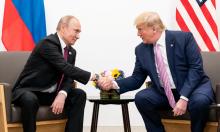Assassination is the extreme form of censorship
After the September 11th, 2001 terrorist attacks, and continuing during the debate over the alleged necessity of waging a "preemptive" war against Iraq, many politicians and commentators in the United States began to endorse draconian tactics that were (at least overtly) anathema during calmer timesю
Torture, secret detentions, denials of due process, and warrantless searches were just some of the methods discussed, and in some cases actually implemented, in the "war against terror." But perhaps the greatest controversy erupted over the proposition that the United States government should rescind Executive Order 11905, put into effect during Gerald Ford's administration in the 1970s.
This order bans United States government employees from engaging in or conspiring to engage in "political assassination." In reality, this furor may ultimately prove to be more cosmetic than real, particularly since a February 25, 2003 news report revealed that the Bush administration had considered ordering the assassination of Saddam Hussein.
This revelation, in turn, prompted a more intricate discussion on ABC television's NIGHTLINE about whether assassination was ever justified, and, if so, under what circumstances. Arguments were made that if Adolph Hitler had been assassinated prior to the outbreak of World War Two, and if this assassination had saved the millions of lives subsequently lost, would it not have been logical, perhaps even moral, to have killed him? And would this argument not carry equal validity when dealing with any tyrant, such as Saddam Hussein?
But on the antithetical side were the words of Malcolm X, who in 1963 had characterized the assassination of former president John F. Kennedy as a prime example of "the chickens coming home to roost". These words generated much outrage, because the "mainstream" media largely ignored Malcolm X's explanation of them: When a government employs assassination as a political strategy, how can it be outraged when the same strategy is visited upon them?
Perhaps the greatest difficulty that arises in dealing with the politics of assassination is its nuances. What activities would violate the prohibition against "political assassination," and what activities would not? The documentary THE MEN WHO KILLED KENNEDY, for example, contained extensive discussion of how the Central Intelligence Agency (CIA), in the late 1950s and early 1960s, endeavored to recruit organized crime figures to assassinate Cuban leader Fidel Castro.
This documentary also alleged that a covert part of the agreement that ended the 1962 missile crisis between the United States and the Soviet Union was an assurance by the Kennedy administration that there would be no future attempts on Castro's life. A more recent documentary on Public Television's FRONTLINE revealed that the CIA had helped to place Saddam Hussein's Ba'ath party in power in Iraq, and had then turned over to him the names of suspected Iraqi communists, who were subsequently tortured and summarily executed, often by Hussein himself.
A March 21, 1993 article in the prestigious ATLANTA JOURNAL AND CONSTITUTION stated that some members of the United States army's 20th Special Forces Group "provided the Ku Klux Klan with "paramilitary training at a farm in Cullman, Alabama" in exchange for information about the civil rights movement in the American South.
Finally, during the early 1970s, the Federal Bureau of Investigation (FBI) reportedly provided weapons to vigilantes targeting members of the American Indian Movement (AIM) on the Pine Ridge Reservation in South Dakota.[Peltier v. United States, 997 F.2d. 961 (8th Cir. 1993)].
The ultimate question that arises from these four examples is, even though employees of the United States government did not actually have their "fingers on the trigger," would these activities, had they occurred today, be a violation of United States law? Perhaps even more problematic is when there is (arguably at least) no conspiracy, because the assassin is being clandestinely manipulated.
Like the CIA, J. Edgar Hoover, longtime director of the FBI, also had no compunction about using organized crime figures to achieve his goals. On May 15, 1968, approximately a month after African-American activist Dick Gregory gave a speech condemning organized crime's influence in poor, predominantly minority communities, the FBI released a memo telling agents to "alert La Cosa Nostra (LCN) to Gregory's attack. . ."
(The term La Cosa Nostra had surfaced in 1963 when Joseph Valachi, a former member of organized crime, had used it during testimony before a United States Senate committee). On November 25th of the same year, another FBI memo instructed agents to take measures to "fully capitalize" upon a "serious struggle" that was occurring between two predominantly African-American groups, the Black Panther Party (BPP) and United Slaves (US)
Four days later a second memo advised that "an anonymous letter. … will be sent to the Los Angeles BPP supposedly from a member of the 'US' organization in which it will be stated that the youth group of the 'US' organization is aware of the BPP 'contract' to kill the leader of 'US' and they, 'US' members, in retaliation, have made plans to ambush leaders of the BPP in Los Angeles. It is hoped this counterintelligence measure will result in an 'US' and BPP vendetta."
On January 17, 1969 this "vendetta" culminated in the killings of BPP members John Huggins and "Bunchy" Carter on the campus of the University of California, Los Angeles (UCLA). In response, the FBI circulated anonymous "cartoons," one showing two dead pigeons, labeled Huggins and Carter, surrounded by a snake symbolizing the 'US' organization. The snake hissed one word: "NEXT?"
Because of its "success" in Los Angeles, this same tactic was also attempted in Chicago, Illinois on January 30, 1969, when authority was "granted to mail [an] anonymous letter" to the leader of the "Blackstone Rangers" designed to "intensify the degree of animosity existing" between the Rangers and Chicago's Black Panther Party, led by Fred Hampton. Although Hampton was not killed as a result of this letter, he ultimately lost his life in December of that same year during a police "raid." (See Leonard Peltier, America's Political Prisoner, PRAVDA, August 13, 2003).
But perhaps the most problematic situation when dealing with the nuances of assassination occurs when there is no incitement, either overtly or covertly, by government officials, but an assassination or violent act occurs simply because the government, despite possessing prior knowledge, does nothing to prevent it.
One of the last individuals imprisoned for refusing to cooperate with the House Un-American Activities Committee (HUAC), which rose to prominence during the "red scare" of the 1950s, was Frank Wilkinson. Wilkinson had been summoned before this committee largely because of the information provided by an informant who had "exhibited emotional instability," and
who was "not considered advisable to use as a government witness." (FBI memo dated November 21, 1961).Nevertheless Wilkinson spent nine months in prison.
On March 4, 1964, Wilkinson gave a speech at the home of a supporter. He later learned that there had been a plot to assassinate him on this date, and that the FBI had been aware of this plot, but had done nothing either to prevent the assassination or to warn him of the impending danger. In fact, the commander of the local police department's "Anti-Subversive Detail" had actually staked out the home to watch the assassination take place.
The same strategy was employed to dissuade the "Freedom Riders," a racially diverse group of civil rights activists seeking to desegregate bus stations in the American South in 1961. An informant advised the FBI that the police chief in Birmingham, Alabama, "Bull" Conner, intended to ignore calls for help from the local bus terminal for fifteen minutes to give a local mob time to attack and beat the riders. Numerous riders were severely injured and a few, like retired professor Walter Bergman, were paralyzed.
Even people as prominent as Dr. Martin Luther King Jr. were targets. After it was announced that King was to receive the Nobel Peace Prize, the FBI sent an anonymous letter to his house, suggesting he commit suicide. When King did not do so, the FBI decided it would no longer warn King of assassination plots against him.
Finally, to demonstrate that these dilemmas linger on, an Associated Press article by Jeff Donn [March 1, 2003] detailed how some FBI agents ignored murders committed by informants involved in organized crime, allegedly because the benefits of ignoring such murders outweighed the costs of preventing them. As one former agent stated, "You have to weigh the odds of whether killing one or two people is better than killing a whole planeload."
Professor Clifford Zimmerman, however, disagreed, and stated in Donn's article that looking at assassination from a purely cost-benefit analysis is fraught with hazards. One such hazard is whether an assassination will even accomplish its intended goal. There is a common belief that killing a leader, particularly a charismatic one, will ultimately destroy any organization or momentum that this leader has built.
Because of this mindset, some organizations intentionally structure themselves to survive the loss of a leader, while others seek to avoid the emergence of a prominent leader at all. The effectiveness of assassination directed against groups that are constructed in this manner is questionable at best.
Another consideration is the reality that leaders rarely operate in a vacuum. For a leader to achieve and remain in power there must be a support system. Oftentimes the loss of a leader simply gives rise to another leader of a similar, or perhaps even more dangerous, nature. In America, for example, speculation continues as to whether the escalation of America's
involvement in Vietnam, promoted by Kennedy's successor Lyndon B. Johnson, would have occurred if Kennedy had not been assassinated.
Also, there is the prospect that an assassinated leader will actually become more powerful because of a "martyr" status. The wonderful folk song JOE HILL states that oftentimes it takes more than weapons to kill someone, because there is a proclivity to rally around and even sanctify a fallen leader. Which brings one back to the Malcolm X dilemma. How can governments advocate assassination directed against others, but express outrage when assassination is directed against them? How can one argue the ethics of killing one "human rights violator" while overtly or covertly supporting or ignoring another?
Then there is the question of morality. There certainly are individuals in the world who cause such contempt and revulsion that few tears would be shed by their demise. But, as the examples above illustrate, far too often individuals targeted for assassination do not fit into this category. Politics, racism and fear of change have motivated assassinations far more frequently than moral revulsion against an individual's deeds. Preservation of the status-quo, no matter how unjust or corrupt the status-quo happens to be, is often paramount, because those in power benefit from the way things are, and are therefore reluctant to see them change.
Finally, there must be concern over who is ordering an assassination. Are the motives just, or are they, as we have seen in recent times, cloaked in garments of deceit, greed and hypocrisy? George Bernard Shaw stated "Assassination is the extreme form of censorship." If a free nation hates the latter, then how in good conscience can it endorse the former?
Subscribe to Pravda.Ru Telegram channel, Facebook, RSS!




